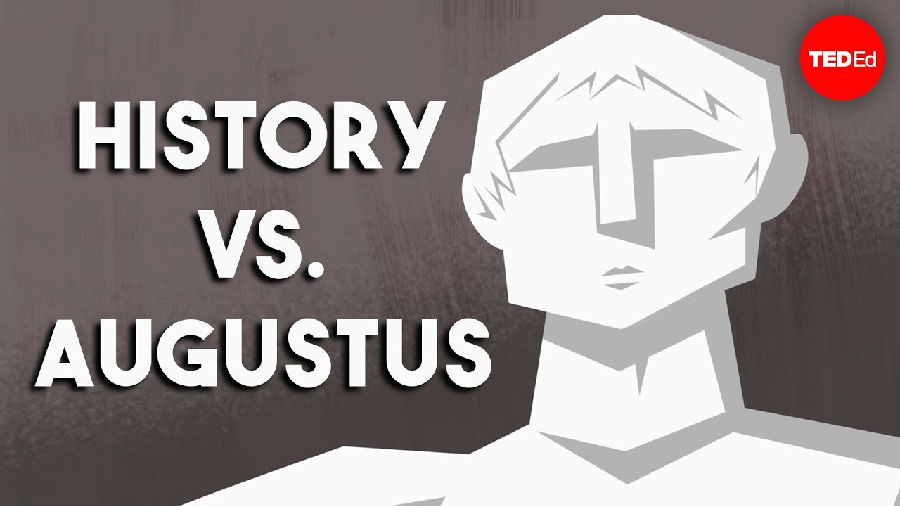(单词翻译:单击)
His reign marked the beginning of one of history's greatest empires and the end of one of its first republics.
他的统治标志着史上其中一个最伟大的帝国的掘起,以及史上第一个共和国的终结。
Was Rome's first emperor a visionary leader who guaranteed his civilization's place in history or a tyrant who destroyed its core values?
罗马的第一个皇帝,到底是个名留青史具远见的领袖,还是摧毁了帝国核心价值的暴君?
Find out in History versus Augustus.
请在《历史审判下的奥古斯都》中找出答案。
Order, order. The defendant today is Gaius Octavius?
肃静,肃静。今天的被告是盖乌斯·屋大维吗?
Gaius Julius Caesar/Augustus...
尤利乌斯·凯撒/奥古斯都...
Do we have the wrong guy?
我们抓错了人吗?
No, your Honor. Gaius Octavius, born in 63 BCE, was the grand-nephew of Julius Caesar.
没有,法官阁下。盖乌斯·屋大维,生于公元前63年,是尤利乌斯·凯撒的甥孙。
He became Gaius Julius Caesar upon being named his great-uncle's adoptive son and heir.
他其后继承了尤利乌斯·凯撒的名字亦成为他这叔公的养子及继承人。
And he gained the title Augustus in 27 BCE when the Senate granted him additional honors.
公元前27年,元老院赐予他额外的荣耀,他获得了奥古斯都这个称号。
You mean when he established sole authority and became emperor of Rome.
你的意思是他独掌政权并成为罗马皇帝。
Is that bad? Didn't every place have some king or emperor back then?
这是件坏事吗?以前不是每个地方都有些皇帝吗?
Actually, your Honor, the Roman people had overthrown their kings centuries before to establish a republic,
事实上,法官阁下,罗马人在几个世纪前推翻了他们的国王而建立一个共和国,
a government meant to serve the people, not the privilege of a ruling family. And it was Octavius who destroyed this tradition.
它的政府应该为人民服务,不是为权贵服务。而屋大维破坏了这个传统。
Octavius was a model public servant. At 16, he was elected to the College of Pontiffs that supervised religious worship.
屋大维是个模范公仆。16岁时,他被选中到监督宗教崇拜的大祭司团。
He fought for Rome in Hispania alongside his great-uncle Caesar
他和他的凯撒叔公在西班牙并肩为罗马而战,
and took up the responsibility of avenging Caesar's death when the corrupt oligarchs in the Senate betrayed and murdered him.
当元老院中腐败的寡头统治集团背叛并且杀了凯撒后,屋大维肩负起为凯撒报仇的责任。
Caesar had been a power-hungry tyrant who tried to make himself a king while consorting with his Egyptian queen Cleopatra.
凯撒是位渴望权力的暴君,他尝试令自己成为皇帝的同时,还与埃及的克丽奥佩脱拉女皇厮混。
After his death, Octavius joined his general Mark Antony in starting a civil war that tore Rome apart,
他死后,屋大维和他的将领马克·安东尼发起了分裂罗马的内战,
then stabbed his ally in the back to increase his own power.
然后屋大维在背后暗算自己的盟友来增强自己的权力。
Antony was a fool. He waged a disastrous campaign in Parthia
安东尼是个蠢材。他在安息帝国发动了一场灾难性的战役,
and plotted to turn Roman territories into personal kingdoms for himself and Cleopatra.
并且密谋把罗马的疆土变成他和克丽奥佩脱拉的私人王国。
Isn't that what Caesar had been accused of? Well...
这不正是凯撒的罪名吗?嗯...
So Octavius destroyed Antony for trying to become a king and then became one himself?
就是说,屋大维因安东尼想做皇帝而把他杀害,然后自己成为皇帝?
That's right. You can see the megalomania even in his adopted title -- "The Illustrious One."
没错。从他的头衔“显赫者”可以看出他狂妄自大。
That was a religious honorific. And Augustus didn't seek power for his own sake.
那是个宗教尊称。奥古斯都不是为了自己才寻求权力。

As winner of the civil war and commander of the most troops,
作为内战中的胜利者和绝大部分部队的指挥官,
it was his duty to restore law and order to Rome so that other factions didn't continue fighting.
恢复罗马的法令是他的责任,如此其他党派便不会继续斗争。
He didn't restore the law -- he made it subordinate to him!
他没有恢复法令,他使法令臣服于他!
Not true. Augustus worked to restore the Senate's prestige,
不是。奥古斯都在恢复元老院的威信,
improved food security for the lower classes, and relinquished control of the army when he resigned his consul post.
提升下级阶层的食品安全,并辞去将领职位时撤除对军队的控制下了功夫。
Mere optics. He used his military influence and personal wealth to stack the Senate in his favor,
这只是表面。他利用自己的军事影响力和个人财富,拉拢元老院投向他的一方,
while retaining the powers of a tribune and the right to celebrate military triumphs.
并保留护民官的权力以及兴祝军事胜利的权利。
He kept control of provinces with the most legions.
他继续掌控着拥有最多军团的行省。
And if that wasn't enough, he assumed the consul position twice more to promote his grandchildren.
如果这还不够,他两次恢复自己执政官的职务,来提拔他的孙子们。
He was clearly trying to establish a dynasty.
他明显地试图建立一个皇朝。
But what did he do with all that power?
但他用这些权力都做了些什么呢?
Glad you asked, your Honor. Augustus's accomplishments were almost too many to name.
幸好你问了,法官阁下。奥古斯都的成就太多,无法说清。
He established consistent taxation for all provinces, ending private exploitation by local tax officials.
他统一所有行省的税制,结束了地方税吏中饱私囊的局面。
He personally financed a network of roads and employed couriers so news and troops could travel easily throughout the realm.
他自资建立道路网并聘请很多信使,使得资讯和军队在王国中容易穿行。
And it was under Augustus that many of Rome's famous public buildings were constructed.
很多罗马着名的公共建筑,都是在奥古斯都时期兴建的。
The writers of the time were nearly unanimous in praising his rule.
当时的作家几乎一致赞扬他的管治。
Did the writers have any other choice? Augustus exiled plenty of people on vague charges, including Ovid, one of Rome's greatest poets.
当时的作家有其他选择吗?奥古斯都以含糊的指控流放了很多人,其中包括奥维德,罗马其中一个最伟大的诗人。
And you forgot to mention the intrusive laws regarding citizens' personal lives
你忘记提及那些干预百姓私生活的法令,
punishing adultery, restricting marriage between social classes, even penalties for remaining unmarried.
惩治通奸,限制社会各阶层间的通婚,甚至处罚不婚者。
He was trying to improve the citizenry and instill discipline. And he succeeded.
他尝试提升公民素质和灌输纪律。而他成功了。
His legacy speaks for itself: 40 years of internal stability,
他的遗产说明了一切:四十年的内部稳定,
a professional army that expanded Rome's frontiers in all directions, and a government still remembered as a model of civic virtue.
一支全方面扩张罗马边境的专业军队,以及一个仍被记得为公民道德模范的政府。
His legacy was an empire that would go on to wage endless conquest until it collapsed, and a tradition of military autocracy.
他的遗产是一个会发动无尽战争直至自我毁灭的帝国,和一个军事独裁的传统。
Any time a dictator in a general's uniform commits atrocities while claiming to act on behalf of "the people," we have Augustus Caesar to thank.
任何时候,当一个独裁者穿着将领的制服施行暴行,同时宣称是代表“人民”执行,那都是奥古斯都·凯撒的功劳。
So you're saying Augustus was a good emperor, and you're saying there's no such thing?
所以你是说奥古斯都是个好皇帝,而你说没有这回事?
We're used to celebrating historical leaders for their achievements and victories.
我们习惯因他们的成就和胜利,颂扬历史上的领袖。
But to ask whether an individual should have such power in the first place is to put history itself on trial.
若我们问一个跟本问题--一个人应否有如此权力,那就相等于将历史送上审判台。


